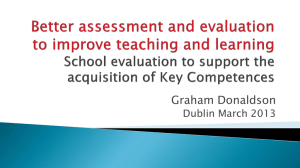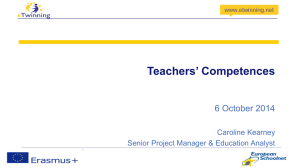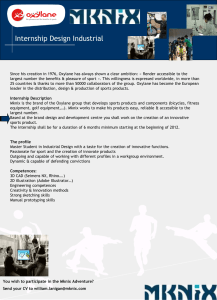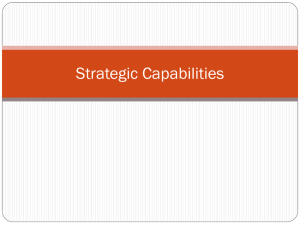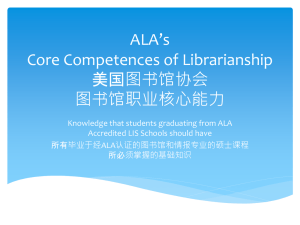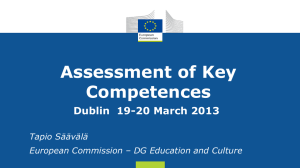Comparing country approaches to assessing key
advertisement
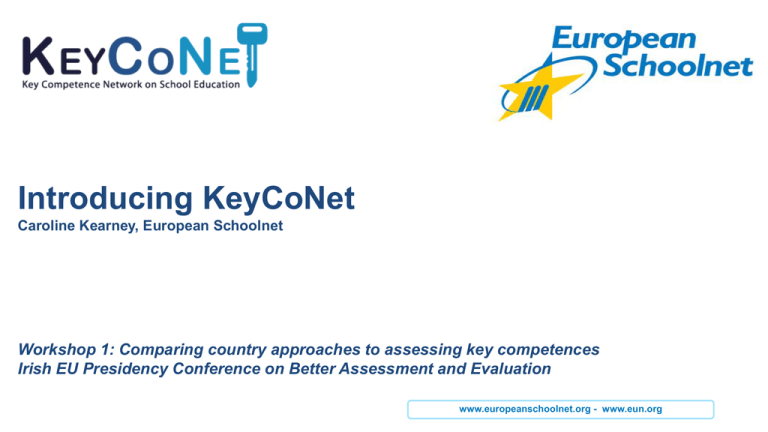
Introducing KeyCoNet Caroline Kearney, European Schoolnet Workshop 1: Comparing country approaches to assessing key competences Irish EU Presidency Conference on Better Assessment and Evaluation www.europeanschoolnet.org - www.eun.org Scope European policy network IMPACT ON POLICIES (recommendations) on the implementation KNOW HOW EUROPEAN FRAMEWORK OF 8 KEY COMPETENCES: 1. COMMUNICATION IN MOTHER TONGUE Subject/knowledge based 2. COMMUNICATION IN FOREIGN LANGUAGES 3. MATHS, SCIENCES & TECHNOLOGY COMPETENCES of key competences 4. DIGITAL COMPETENCE 5. LEARNING TO LEARN 6. SOCIAL AND CIVIC COMPETENCES Cross-curricular areas 7. SENSE OF INITIATIVE AND ENTREPRENEURSHIP 8. CULTURAL AWARENESS AND EXPRESSION These key competences are all interdependent, and the emphasis in each case is on: in school education • critical thinking • creativity • initiative • problem solving PRIMARY & SECONDARY • risk assessment • decision taking EDUCATION GENERAL • constructive management of feelings Two main working areas Website, literature Curriculum reform, pilot project, school experiment, national Identifying Increasing analysing network mapping influence etc. KCD INITIATIVES & IMPLEMENTATION Phases, role of notes/studies, PLVs, videos, country overviews, newsletter, webinar, online strategy, public debate, legislation, reviews, case STRATEGIES consultation on through recommendations etc. dissemination and membership Spread of various stakeholders in stakeholders, countries covered evaluation, etc. Other EU countries Core remit: identifying and analysing emergent strategies in implementing key competences into education reforms, and producing recommendations. Major focus Teacher Student training assessment How to implement a holistic approach for an effective change in the student curriculum? Learning School resources organisation Enablers? Obstacles? Partners Policy Research Practice •BMUKK (AT) •DGESCO (FR) •AKOV (BE - nl) •CEJA (ES) •NCCA (IE) •TIGER LEAP (EE) •Uni. Helsinki (FI) •Uni. Jyväskylä (FI) •EIESP (FR) •IFE (FR) •Uni. Oslo (NO) •Uni. Lisbon (PT) •Uni. Minho (PT) •UNED (ES) • INSP.GEN (FR) • REKTORSAKADEMIEN (SE) • JA-YE (BE) Consult our website & outputs Website (http://keyconet.eun.org) Brochure Lit. review on KC assessment Case note catalogue Newsletter Outputs on USB Structure of workshop Two presentations Group discussions Feedback • UK example (K. Grant) • FR examples (B. Pajot) • 3 groups (led by KeyCoNet partners) • 1 question to answer per group • Rapporteurs to feedback 3 main points emerging from group discussion Questions for group discussion Group 1: How are KCs assessed? Group 2: Portfolios Group 3: ICT • Are key competences assessed in your country? • If so how are they assessed: through the curriculum or as an extra assessment and qualification? • What are the advantages and disadvantages of each? • The use of portfolios as an assessment approach recognises the complexity of assessing experiential and active learning without reducing the process into an assessment focused on the acquisition of knowledge alone. • What are your views? • Can ICT contribute to the assessment and evaluation of key competences? • What are your experiences of the use of ICT in relation to key competences in your country? ASDAN Certificate of Personal Effectiveness (CoPE) Kath Grant – Head of Personal Effectiveness, ASDAN ASDAN Certificate of Personal Effectiveness CoPE Key Competences in Personal and Communication Skills Assessed Competences in… • • • • • • Working With Others Improving own Learning Problem Solving Research Discussion Oral Presentation Teaching & Assessment Contexts • • • • • • Enterprise Community & Volunteering Work Experience Outdoor & Adventure Expressive Arts Academic Recording documents - mandatory Supporting Evidence – individual Support from Employers “Building up my own interior design business took skills they don’t necessarily teach you in school, skills like creative thinking and problem solving. Young people should be encouraged, through education, to follow their own passions and interests. They’re going to be much more motivated if they are allowed to express their individuality and if they can see how their learning connects to real life outside the classroom. I left school at 18 and it took me a while to find my calling, but once I did, there was no stopping me. Success came from pursuing my passion for vintage designs and from having the confidence to buck the trends of the time. It would be great if schools could instill that sense of self-belief in all students, and recognise creativity in the same way that they recognise academic achievement. That’s why qualifications like ASDAN’s CoPE are so important, because they allow young people to be recognised and rewarded for their individual talents, without requiring them to ‘fit the mould’.” Cath Kidston Support from Employers “Employers need young people with the employability skills essential for work-and life. These skills- application of numeracy and literacy and IT, self management, team working, problem solving, business awareness-can be developed through school based study and work experience. Students who take ASDAN’s Certificate of Personal Effectiveness should be able to demonstrate that they have the skills employers are looking for-and they will be warmly welcomed by employers.” Susan Anderson CBI Endorsement by HE Bath Spa University Brunel University Burton College De Montfort University Goldsmiths College Harper Adams University College Heriot-Watt University King’s College London Leeds College of Music London Metropolitan University Loughborough University Mid – Cheshire College New College Nottingham Newman University College Nottingham Trent University Oxford & Cherwell Valley College Swansea University Swansea Metropolitan University The Royal Agricultural College (Formerly Swansea Institute of Higher Education) University of Abertay Dundee University of Aberdeen University of Bradford University of Bedfordshire University of Buckingham University of Cumbria University of Derby University of Dundee University of Glasgow University of Huddersfield University of Liverpool University of Newcastle Wakefield College York College Network • Free local meetings 3x year • Cluster Leader advice • Interim feedback Resources • • • • • • CoPE resource pack CoPE demonstration portfolios CoPE posters CoPE Schemes of Work ; Levels 1 & 2 CoPE portfolio binder CoPE stickers Assessment of Key Competences: two French examples in lower secondary education Bertrand PAJOT – General Inspectorate – French Ministry of Education KeyCoNet Workshop 19 March 2013- Dublin Castle Background: • • A national policy: the development of the “socle commun” (core curriculum of knowledge and competences) introduced by the 2005 law, with 7 competences mainly mainly based on the European Key competences framework, and concerning each level of compulsory education (primary and lower secondary schools). A centralized country…but with the possibility of pedagogical initiatives at local level: – – linked to national experiments, which want to test new pedagogical approaches or tools. Linked to local experiments, in which pedagogical teams want to test new “know-how” to answer to specific needs for their pupils. Example 1: • A pilot competences portfolio (collège de Montastruc): – Uses a pilot portfolio, defined at national level, but possibly adapted to local use. – Compiles in and outside schools’ competences – Helps each student to : • have a better understanding of competences • develop confidence in their own abilities and self esteem, at an age in which their relations with teachers change a lot. • highlight their experiences and informal learning Example 2: • Competences and self esteem ( collège de Vérac): – implementation of non numerical assessments to reinforce students’ self esteem and involvement in their studies. – development of an IT tool by the pedagogical team to help assessment of the disciplinary and cross curricula competences. Results: • A better mastering of key competences by the teachers (content, link to syllabi and subjects, assessment of processes, etc.), • Changes in students’ attitude toward their schooling, implying less stress about their learning skills. • A real interest in other ways to assess: portfolio, non numerical evaluation by all stakeholders. • positive influence in students’ achievement • better image of the school by the students and their families. Prospects: • Use these initiatives (and many others…): – To help teachers improve their teaching and assessment by competences, “hot issues” in many lower secondary schools. – To produce resources for initial and in service training, identifying best practices. – To extend these methodologies to upper secondary education (“lycée”) • Provide information for the new education act in which the core curriculum’s objectives are completed by the ideas of culture as well as knowledge and competences. • Many thanks for your attention.
